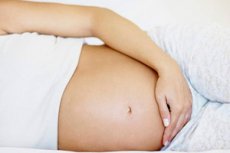Medical expert of the article
New publications
Constipation during pregnancy - tips for moms-to-be
Last reviewed: 04.07.2025

All iLive content is medically reviewed or fact checked to ensure as much factual accuracy as possible.
We have strict sourcing guidelines and only link to reputable media sites, academic research institutions and, whenever possible, medically peer reviewed studies. Note that the numbers in parentheses ([1], [2], etc.) are clickable links to these studies.
If you feel that any of our content is inaccurate, out-of-date, or otherwise questionable, please select it and press Ctrl + Enter.

Pregnant women face many difficulties, including difficulty in defecation (constipation). Constipation bothers a large number of women during pregnancy and after childbirth.
During pregnancy, as the fetus grows, the enlarged uterus compresses the intestines. Venous outflow is disrupted, venous congestion of the pelvic vessels appears. The veins of the rectum expand, hemorrhoids develop. Hemorrhoids contribute to constipation.
The human body produces substances that stimulate intestinal contractions. The intestinal musculature during pregnancy is not very receptive to such stimulants. If intestinal motility during pregnancy were excessively active, these actions would stimulate the contractile activity of the uterus. Contractions of the uterus during pregnancy threaten to terminate the pregnancy. This is the positive side of the protective reaction, the negative side is the occurrence of constipation.
Constipation is also caused by hormonal imbalances that occur in pregnant women. Pregnant women produce the hormone progesterone, which slows down the digestion process.
During pregnancy, women are often subject to stress, they are tormented by unreasonable fears. Constipation in pregnant women is often caused by stressful situations. After childbirth, constipation bothers women much less often - the emotional state of women improves noticeably.
Constipation is defined as the absence of bowel movements for three days or more. Constipation in pregnant women is accompanied by abdominal pain and a feeling of incomplete bowel movement.
In case of constipation in pregnant women, it is better to consult a nutritionist who will prescribe a diet. A pregnant woman should eat a lot of fiber. Fiber is not digested, it increases the volume of feces and promotes normal bowel movements. The diet of a pregnant woman must include fresh vegetables and fruits, bread, fermented milk products, kvass, cabbage soup.
Pregnant women are advised not to consume chocolate, black coffee, tea in large quantities, cocoa, or eat dry food.
Prune tincture is good for constipation in pregnant women. One hundred grams of prunes should be poured with two glasses of boiling water, covered with a lid and left for about ten to twelve hours. Prune tincture should be drunk before meals. Drinking cold water with a spoonful of honey added to it on an empty stomach is also considered a good remedy for constipation.
During pregnancy, various methods of combating constipation are contraindicated - electrophoresis of novocaine, inductothermy, electrical stimulation, diadynamic currents, a procedure using sinusoidal modulated currents. These methods are not used due to the high risk of stimulation of uterine contractions, as well as due to the negative impact on the fetus.
Taking laxatives can cause miscarriage. It is dangerous to take not only strong drugs, but also weak ones - such as senna leaves, rhubarb, buckthorn bark. Drugs such as bisacodyl and caffeol cause cramping pain in the abdomen and diarrhea. Taking laxatives is undesirable; in case of constipation, the best way out is to take fiber.


 [
[